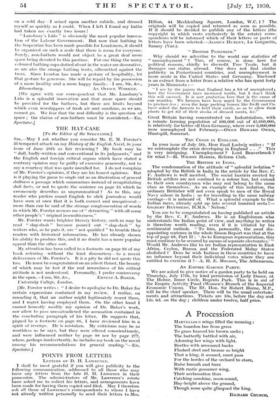THE HAT-CASE
[To the Editor of the SrEcraron.] Sin,—May I ask whether you consider Mr. E. M. Forster's ill-tempered attack on my History of the English Novel, in your issue of June 28th as fair reviewing ? My book may be "dull, badly-written and conventional in its judgments," and the English and foreign critical organs which have stated a contrary opinion may be guilty of excessive generosity, not to say a courtesy that was quite uncalled for. I do nut complain of Mr. Forster's opinions, if they are his honest opinions. But is it playing the game to single out as an illustration of general dullness a passage which summarizes instead of recapitulating dull facts, or not to quote the sentence on page 13 which he erroneously describes as ungrammatical ? As to this, any reader who prefers sound English to slick journalese would have seen at once that it is both correct and unequivocal— snore than can be said of the strange conglomeration of words in which Mr. Forster accuses me of" detracting " with all sonic other people's" original insensitiveness."
Mr. Forster wants brighter literary history, such as may be read " slap-dash " because poured out " slap-dash " by writers who, as he puts it, are not qualified" to trouble their readers with historical information. He has already shown his ability to produce this, and it no doubt has a more popular appeal than the other sort.
My attention has been called to a footnote on page 88 of my book referring—without the least discourtesy—to a recent deliverance of Mr. Forster's. It is a pity he did not quote this too. He must be congratulated on an adroit thrust, the beauty of which may be lost if the real inwardness of his critical attitude is not understood. Personally, I prefer controversy [Mr. Forster writes : " I desire to apologise to Dr. Baker for certain expressions contained in my review. I realize, on rereading it, that an author might legitimately resent them, and I regret having employed them. On the other hand I cannot honestly modify my opinion of Dr. Baker's work, nor allow to pass uncontradieted the accusation contained in the concluding paragraph of his letter. He suggests that, piqued by a footnote on page 88, I have reviewed him in a spirit of revenge. Ile is mistaken. My criticisms may be as worthless as he says, but they were offered conscientiously, and were influenced neither by page 88 nor by page 277, where, perhaps inadvertently, he includes my book on the novel among his recommendations for general reading."—En. Spectator.]




































 Previous page
Previous page